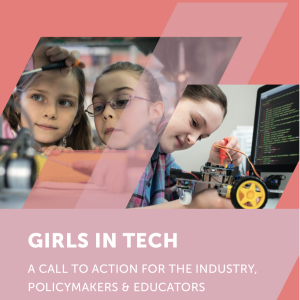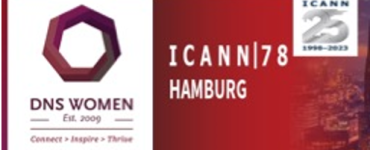- Across the globe, just one quarter of IT & tech specialists are women, and in Europe the proportion is even lower at 18.5 percent.
- At the age of 15, ten times more boys than girls have an interest in becoming tech professionals.
- eco Association publishes a white paper “Girls in Tech: A Call to Action”, with research findings and recommendations for action for IT & tech companies, policymakers, educators and parents.
Female professionals are significantly underrepresented in the IT & tech industry: In the US, approximately one in four (26.2 per cent) professionals in tech are female, while in Europe not even one in five (18.5 per cent) are women.1 In 39 of the OECD member states, only 20 per cent of computer science graduates are female, while in many European countries – such as France, the Netherlands and the UK – the share of such graduates is even below 15 per cent.2 Traditional stereotypes are blocking girls’ path to a successful career in tech at an early age. For example, ten times fewer girls than boys consider taking up a technical profession at the age of 15.3 In order to counteract this imbalance, to provide impetus to the debate, and to offer recommendations for companies, policymakers, educators and parents, eco – Association of the Internet Industry has published a white paper entitled: “Girls in Tech: A Call to Action” on the occasion of Girls’ Day, 28 April 2022.
“The highly innovative and robust IT industry is already experiencing a glaring skills shortage, with this bringing about serious repercussions. This deficit of employees with advanced digital skills is a major factor contributing to the deceleration of the digital transformation in EU Member States. Companies now need clear strategies adopted at top management level to significantly increase the number of women in tech”, says eco Chair of the Board Oliver Süme. In the 2021 Digital Economy and Society Index (DESI), 55 per cent of EU companies say they have difficulty recruiting ICT professionals.4 In Süme’s view, the causes of the gender gap in the Internet industry are multi-faceted, including in particular aspects such as digital education shortcomings, traditional role models, and insufficient career guidance. From this perspective, eco therefore welcomes the concept of Girls’ Day and seeks the counteraction of stereotypes in career choices at an early age, the promotion of digital skills, and raising girls’ inspiration for STEM and technology. “We need a rethink across society so that more women find their way into the tech industry in the future. The industry, policymakers and educational institutions must work together to initiate and promote this rethinking. Educational offers and initiatives such as our #LiT – Ladies in Tech are essential so that girls and women discover and take advantage of the diverse career options in tech and IT”, adds Lucia Falkenberg, Chief People Officer at the eco Association and DE-CIX, and founder of the eco #LiT – Ladies in Tech initiative.
eco white paper with recommendations for action for IT companies, political decision-makers, educators and parents
The eco white paper “Girls in Tech: A Call to Action” examines the status quo of women in the Internet industry based on current statistics, discloses the causes of the gender gap in the IT & tech sector and, based on research findings, illustrates that inhibitions and disinterest of girls towards IT & tech are not due to inherent causes. Instead, these disincentives are primarily due to socialisation issues, a lack of role models, and stereotypes in media and marketing. Interviews with female experts and executives in the IT & tech scene from Europe, the US and Africa provide empirical experience which presents best practices for promoting girls and women in tech as well as career potential for women in the Internet industry. For achieving gender diversity, IT & tech companies will find concrete recommendations for action in the white paper. These include, in particular, making female role models visible, anchoring diversity as a core principle in the corporate culture, initiating specific networking and mentoring formats, as well as engaging and being proactive in the field of digital education.
Education plays a key role on the path to more gender diversity in the IT & tech industry. This is because gender stereotypes are often cultivated in childhood at home and in schools and have a lasting influence on career choices. In order to create effective change, a joint effort of all actors from the industry, politics and civil society is therefore needed. For this reason, the white paper also contains guidelines for political decision-makers and educators as well as concrete recommendations for parents. The spectrum of recommendations ranges from digital competence in kindergartens and mainstream schools, to parenting initiatives, right through to higher education, training and e-learning courses, mentoring, and out-of-school initiatives.
The complete white paper is available for download free of charge.
Sources:
1 Eurostat, 2021, US Bureau of Labor Statistics, 2021
2 OECD, 2022
3 OECD Report, BRIDGING THE DIGITAL GENDER DIVIDE INCLUDE, UPSKILL, INNOVATE
4 EU Commission Digital Economy and Society Index, November 2021




